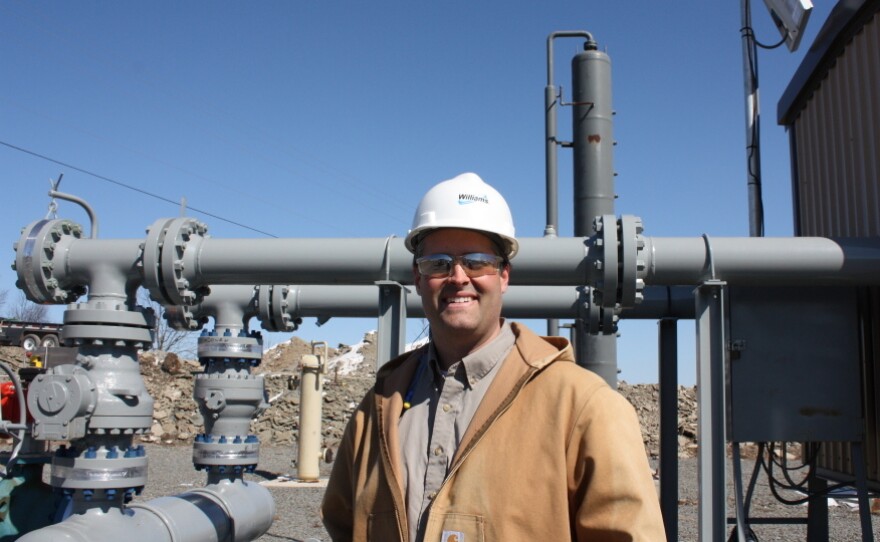The ongoing nuclear disaster in Japan may undermine support for nuclear power in the U.S. If it does, other sectors of the energy economy stand to benefit — none more than the natural gas industry.
A natural gas boom is already underway in the 400-million-year-old Marcellus shale reserves beneath Pennsylvania. That boom is apparent on a hilltop about an hour from Wilkes-Barre, Pa., where the farmland and forest give way to a brand new industrial site known as the Lathrop compressor station. It's a collection of pipes and compressors that help move natural gas from local wells to market.
"There are about 75 wells behind this particular station, and plans to double that over the next couple of years," says Michael Dickinson, a manager for Williams Companies Inc. The company operates two compressor stations in Pennsylvania, with plans to add three more. It's also building a new 30-mile stretch of pipeline to transport natural gas on to Philadelphia and New York City.
"Those pipelines are kind of like the railroads are to the coal industry, or the high line wires are to the electricity industry," Dickinson says. "We have to have those pipelines — that infrastructure — to get this gas to the place that it can be used."
Impact On The Marcellus Shale
The Marcellus shale, which runs from Kentucky to upstate New York, contains one of the largest natural gas reserves in the world, although the gas has been difficult to extract until recently. Energy experts say the accident at the Fukushima Dai-ichi nuclear plant in Japan may accelerate development in Pennsylvania, as the U.S. and other countries will likely put the brakes on plans for additional nuclear power plants, at least in the short run.
"The big beneficiary here will be natural gas," says Daniel Yergin, chairman of IHS Cambridge Energy Research Associates and author of the Pulitzer Prize-winning book The Prize: The Epic Quest for Oil, Money and Power. Natural gas is relatively clean and cheap to burn, he says, while environmental regulations in the U.S. make new coal plants unlikely. Meanwhile, renewable power sources like wind just aren't ready to satisfy the demand for electricity.
Pennsylvania Hopes To Become The 'Texas' Of Natural Gas
"Natural gas now has become much more competitive as a source of new electric generation in the United States," Yergin says. "That was true before the nuclear accident. It is even more true after the accident."
Pennsylvania Gov. Tom Corbett is eager to exploit the state's gas reserves. In his first budget address since taking office this year, the Republican announced his goal of making Pennsylvania into "the Texas of the natural gas boom." Supporters of increased natural gas drilling say Pennsylvania needs the thousands of new jobs the gas industry promises.
Fear Of Drinking Water Contamination
But the issue is increasingly divisive. In order to get natural gas out of the Marcellus shale, drillers have to use a process known as hydraulic fracturing or fracking. That produces lots of wastewater, which critics fear will contaminate drinking water supplies.
Those concerns got a lot of attention in Gasland, director Josh Fox's Oscar-nominated documentary. The natural gas industry and state regulators denounced the film as misleading and one-sided. But those who study the industry say you can't dismiss its claims entirely.
"The industry in earnest is trying to do the right thing in, you know, most cases," says David Yoxtheimer, a hydrogeologist at Penn State University's Marcellus Center for Outreach and Research. "Now, have there been some unfortunate environmental incidents? No doubt about it. So, what we need to do is make sure we do have the proper regulations in place, make sure the companies are using the best available technologies," he says.
For now, regulators in New York have put a moratorium on new gas wells while they study the environmental impact. In Pennsylvania, Corbett created a commission to explore whether new regulations are necessary. The group will report back to him this summer. But Pennsylvania regulators may have to work fast, because no one expects the natural gas industry to wait.
Copyright 2022 NPR. To see more, visit https://www.npr.org. 9(MDAzMjM2NDYzMDEyMzc1Njk5NjAxNzY3OQ001))







